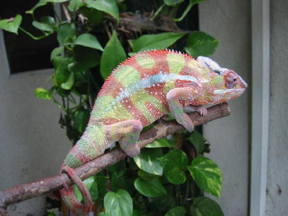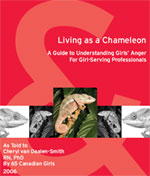Girls and Women's Anger
"Living as a Chameleon"
A Guide to Understanding Girls' Anger for Girl-Serving Professionals
Anger Denied
Anger is a necessary human emotion. Yet narrow beliefs about femininity continue to erode and deny young women of their right to feel and express anger. In Canada and other Western cultures, some continue to link anger to aggression, and define it as a sign of mental instability. Countless young women now list being prescribed an anti-depressant as a component of their adolescence.
When anger is dismissed or silenced, young women, out of fear of judgement, violence or rejection, take on chameleon-like lives, learning to change themselves in order to blend in and protect themselves from harm. Like the chameleon, they live not for their own color, but for the color of their surroundings, striving to become undetectable, moving quietly and cautiously as they attempt to read their ever-changing surroundings.
Living as a Chameleon is a groundbreaking collaborative study conducted in partnership with girls, girl-serving professionals and organizations in communities across Canada. Interviews with a diverse group of 65 girls were conducted to better understand what generates anger, how they are permitted to express it, its relationship to depression, and to develop girl-driven recommendations that enable girls to live authentic lives.
Background
 The magnitude of depression experienced by Canadian girls and young women is well documented (Youth Net, 2003; Validity Project CAMH, 2006; Adlaf, R., Pagliuz, A. & Beitchman, J.2004; Ross, E., Ali, A. and Toner, B., 2003; CICH, 1997; Brown, 1998; Gilligan, 1990; van Daalen-Smith, 2004). A two year innovative study exploring one component of young women's depression - anger -yielded compelling links between denied anger, denied authenticity and depression. Service providers who wish to prevent young women's depression will benefit from the recommendations put forth by Living as a Chameleon. The depression of girls is a real world issue and this innovative research addresses one neglected and misrepresented component: anger.
The magnitude of depression experienced by Canadian girls and young women is well documented (Youth Net, 2003; Validity Project CAMH, 2006; Adlaf, R., Pagliuz, A. & Beitchman, J.2004; Ross, E., Ali, A. and Toner, B., 2003; CICH, 1997; Brown, 1998; Gilligan, 1990; van Daalen-Smith, 2004). A two year innovative study exploring one component of young women's depression - anger -yielded compelling links between denied anger, denied authenticity and depression. Service providers who wish to prevent young women's depression will benefit from the recommendations put forth by Living as a Chameleon. The depression of girls is a real world issue and this innovative research addresses one neglected and misrepresented component: anger.
Emotions provide us with important information about what is going on around and within us. Emotions are messages about our experiences and the experiences of others. Gilligan (1990) asserted, "anger is the political emotion - par excellence - the bell weather of oppression, injustice, bad treatment, [and] a clue that something is wrong in the relational surround" (p. 527). Denied anger, therefore, prevents girls from both protecting and knowing self - two key components of mental health and quality of life.
Health is the increased becoming of who we are most deeply.
~ Anonymous
Report
 The complete report of the study is available online
The complete report of the study is available online ![]()


